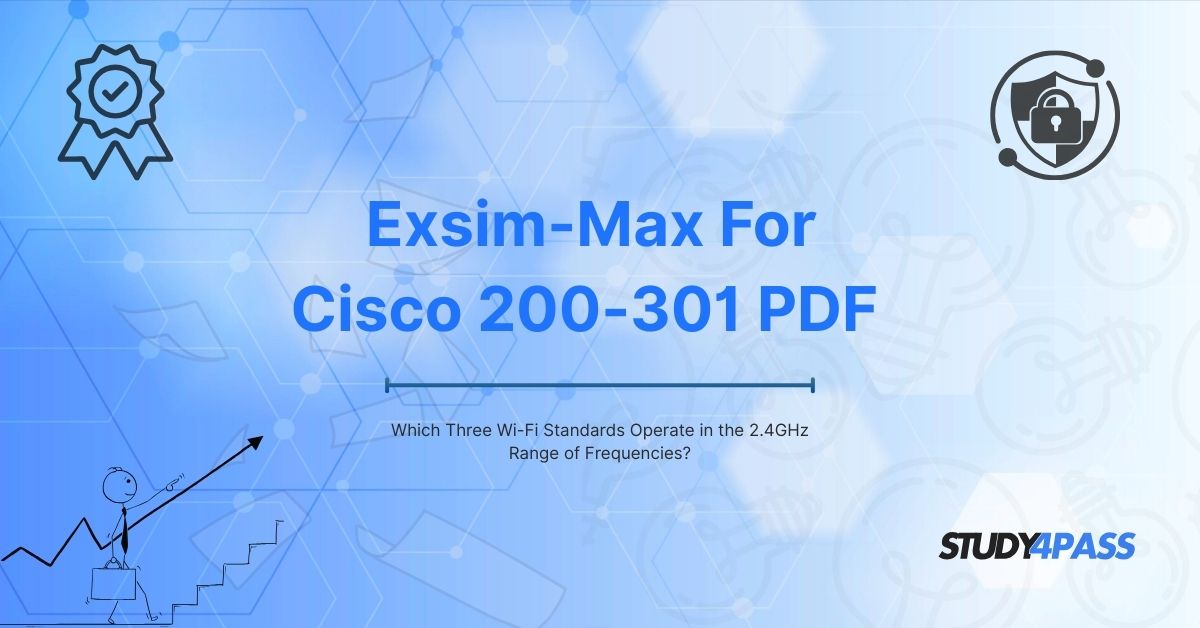Introduction To Exsim-Max For Cisco 200-301 CCNA PDF
When preparing for theCisco 200301 CCNA exam, understanding WiFi standards is crucial, especially those operating in the2.4GHz frequency range. This knowledge is essential for network configuration, troubleshooting, and optimization. If you're using resources like theExSimMax for Cisco 200 301 CCNA PDF from Study4Pass, you’ll find detailed explanations and practice questions on this topic.
- Thethree primary WiFi standards that operate in the2.4GHz band
- Their key features, advantages, and limitations
- How this knowledge applies to theCCNA exam
Before discussing the specific standards, it’s important to understand the difference between 2.4GHz and 5GHz bands:
2.4GHz Band:
- Longer range butmore susceptible to interference (microwaves, Bluetooth, cordless phones).
- Fewer nonoverlapping channels (only three in most regions).
- Slower maximum speeds compared to 5GHz.
5GHz Band:
- Faster speeds butshorter range.
- More nonoverlapping channels, reducing congestion.
- Less interference from household devices.
For theCCNA exam, knowing which standards operate in each band is critical.
The Three WiFi Standards Operating in the 2.4GHz Range
Thethree main WiFi standards that use the2.4GHz frequency are:
A. IEEE 802.11b
Introduced: 1999
Max Speed: 11 Mbps
Key Features:
- First widely adopted WiFi standard.
- UsesDSSS (Direct Sequence Spread Spectrum) for signal modulation.
- Compatible with older devices butslow by modern standards.
Limitations:
- Highly prone to interference.
- Obsolete in most modern networks.
B. IEEE 802.11g
Introduced: 2003
Max Speed: 54 Mbps
Key Features:
- Backward compatible with802.11b.
- UsesOFDM (Orthogonal Frequency Division Multiplexing) for better efficiency.
- Improved speed while maintaining2.4GHz range.
Limitations:
- Still suffers frominterference Cisco 200-301 Certification ccna pdf due to the crowded 2.4GHz band.
C. IEEE 802.11n (WiFi 4)
Introduced: 2009
Max Speed: 600 Mbps (theoretical)
Key Features:
- Operates inboth 2.4GHz and 5GHz (dualband).
- IntroducedMIMO (Multiple Input Multiple Output) for better throughput.
- Wider channel bandwidth (40MHz) for faster speeds.
Limitations:
- In the2.4GHz band, performance is still limited due to interference.
Why Does This Matter for the CCNA Exam?
TheCisco 200301 CCNA exam tests your knowledge of wireless networking, including:
- Frequency bands and their characteristics
- Interference and channel selection
- Compatibility between different WiFi standards
Using resources like theExSimMax for Cisco 200301 CCNA PDF fromStudy4Pass can help you master these concepts with:
- Real examlike questions
- Detailed explanations
- Performance tracking
Best Practices for 2.4GHz Networks
- Since the2.4GHz band is crowded, follow these tips for better performance:
- Use nonoverlapping channels (1, 6, 11) to minimize interference.
- Upgrade to 5GHz where possible for faster speeds.
- Limit the number of devices on 2.4GHz in highdensity areas.
Conclusion
Understanding thethree WiFi standards (802.11b, 802.11g, and 802.11n) that operate in the2.4GHz range is essential for theCisco 200301 CCNA exam. These standards differ in speed, modulation techniques, and compatibility, which impacts realworld networking scenarios.
Special Discount: Offer Valid For Limited Time “Cisco200-301 Exam Prep Practice Test”
Sample Questions for Cisco 200-301 Exam Prep Practice Tests
What is the primary purpose of the ExSim-Max for Cisco 200-301 CCNA practice exams?
A) To provide free PDF study guides for the CCNA exam
B) To simulate the real Cisco 200-301 exam with high-quality practice questions
C) To replace the need for official Cisco certification training
D) To offer video tutorials for CCNA lab configurations


